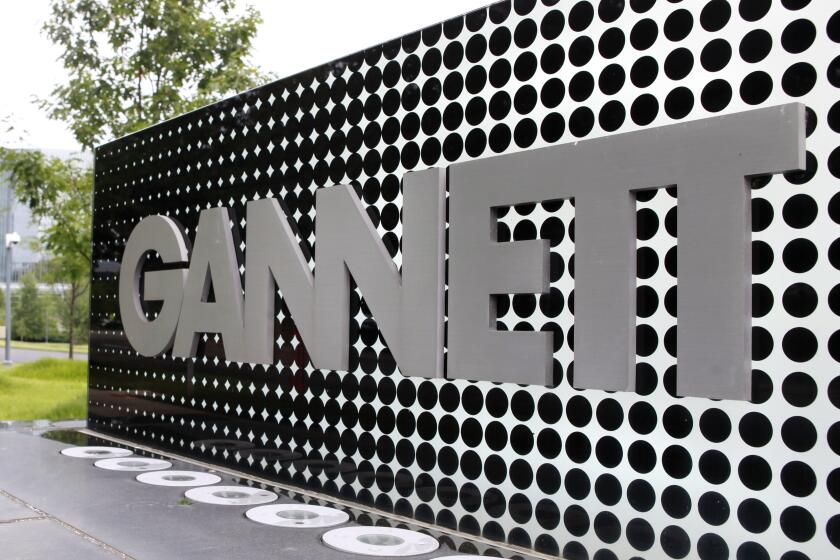A new law can help us keep the robust free press our democracy needs

- Share via
A free and robust press is a central ingredient of a flourishing and democratic society — and given the number of existential crises we now face, also critical to its survival. Yet today, the journalism sector is collapsing. The number of newsroom jobs has declined by more than 30,000 since 2008, while local news deserts continue to grow and spread.
A major factor in this decline is the rise of powerful internet platforms, like Google and Facebook, which currently control the bulk of digital advertising and have become the main source of news for many Americans. A huge number of search results on Google link to news stories, reproducing enough content for users to consume. But 65% of these users do not click through to the news publishers’ websites. This means that even when their work has delivered value to the public, the businesses actually investing in and doing the work of journalism can’t earn sufficient advertising revenue to cover their costs. Needless to say, this is not economically sustainable. Hence, the devastating decline in the entire sector.
It’s important to recognize what is driving the problem here: It isn’t the “free market” or even technological changes per se, but the specific market design, which the law helps to shape.
As the owner of more than 400 local weeklies and dailies in 46 states, Gannett stands as a telling illustration of the economics of local newspapers.
These dominant internet platforms have effectively collected market power within their own corporate boundaries, ultimately allowing them to dictate terms to other businesses whose content they use. Yet, the law prevents journalistic enterprises from coordinating among themselves to bargain with these giant platforms for the value of their product.
A straightforward solution to the problem is to allow the newspapers and media companies to band together for the purpose of negotiating with the internet platforms for payment for the content they create.
That is exactly what the bipartisan Journalism Competition and Preservation Act, currently in Congress, would do. It would authorize news outlets to create “joint negotiating entities” to bargain for compensation from internet platforms for the news stories they use; it would also require binding arbitration if there’s no agreement over a specified period of months. The largest national newspapers and television networks would be excluded and the legislation would sunset after eight years.
The bill also creates a carve-out from federal antitrust law, the statutory framework that regulates economic competition and coordination. Make no mistake, this legal framework — which most people think of as simply promoting competition — today already allocates economic coordination rights to large, powerful corporations such as Google and Facebook, to the detriment of smaller players.
Some critics oppose the JCPA because they say it would create a “news media cartel.” But this criticism misunderstands both antitrust law and how economies actually work. Despite its current tendency to delegate market management to powerful firms like the dominant internet platforms, antitrust law has also long authorized numerous forms of coordination between otherwise independent enterprises in circumstances very similar to the one proposed for news media companies.
The antitrust exemption for labor negotiations as well as longstanding exemptions for agricultural businesses and fisheries are all examples of authorized economic coordination in which smaller, less powerful players are allowed to band together to bargain with a more powerful and dominant actor, such as an employer or an agricultural processor, or in this case, an internet platform.
Not only are such exemptions, or “safe harbors,” from antitrust’s regulation of coordination already well-established in the legal architecture of our economy, it is hard to imagine the economy functioning well without them.
More than a quarter of the country’s newspapers have closed since 2005. In places that lost a local paper, voters have become more polarized.
Productive economic activity and the systems of distribution and commerce built on top of it require both competition and coordination, and our law and institutions, including antitrust law, recognize this while channeling and shaping both.
Indeed, the powerful platforms with whom news publishers currently deal, and with whom they would collectively negotiate, are not tightly knit production units but are instead vast sprawling empires containing distinct but interconnected operations and investments. The bargaining power they have amassed within their corporate boundaries is vast. It’s reasonable to balance their substantial coordination abilities with the relatively modest coordination rights granted to journalistic enterprises under the proposed bill.
There is also recent precedent for authorizing exactly this type of news media coordination. Australia used its competition law to impose a similar rule last year, which has effectively required Facebook and Google to pay for the news content they distribute. That new system has already resulted in a significant shift in the distribution of revenues, resulting in more investment being channeled back into the work of journalism.
The JCPA falls squarely within the American antitrust tradition. The Sherman Act, the foundational federal antitrust law, was the ultimate outcome of the efforts of a farmer-labor political coalition, which aimed to foster cooperation among smaller players and to rein in monopoly directly. A careful examination of the legislative history, political and intellectual context and common law antecedents shows that Congress never intended to proscribe or even discourage such forms of economic coordination when it passed the Sherman Act.
The JCPA is good policy that effectively responds to an urgent need, and it is a good fit with the underlying purposes of antitrust law.
Sanjukta Paul is professor of law at University of Michigan Law School and author of the forthcoming book “Solidarity in the Shadow of Antitrust: Labor and the Legal Idea of Competition.”
More to Read
A cure for the common opinion
Get thought-provoking perspectives with our weekly newsletter.
You may occasionally receive promotional content from the Los Angeles Times.








